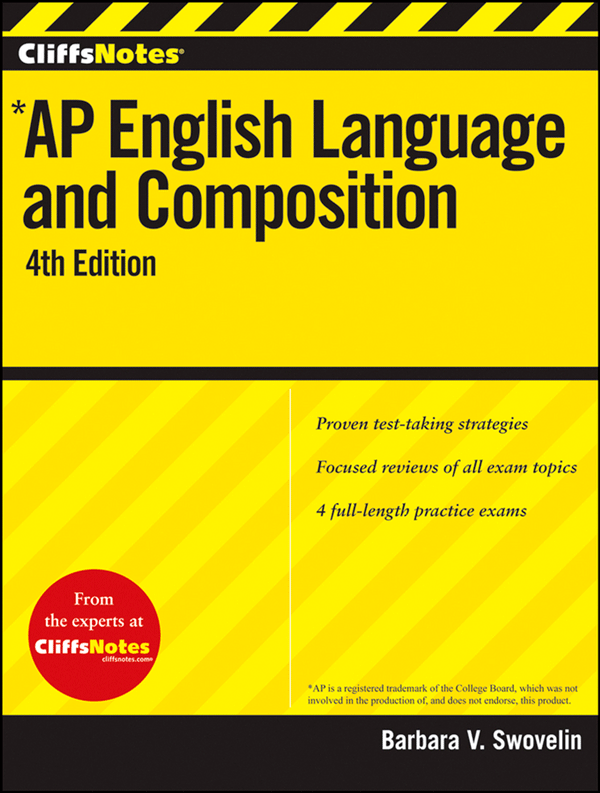Buy This CliffsNotes Book Here!
 Wondering how to approach AP English Language and Composition reading passages and test questions? Consider these helpful tips:
Wondering how to approach AP English Language and Composition reading passages and test questions? Consider these helpful tips:
First, skim the question to find out what you should concentrate on. Skimming the questions before reading the passage helps you focus on what the test-writers found important. Skimming involves a very fast reading speed — approximately 1,000 words per minute — so be aware that during this skimming, you are really just glancing at the questions. Ignore any "generic" questions, such as ones that ask you the author's main purpose or main point; instead, try to find approximately five specific ideas that you can look for while you read the passage. Do not try to memorize the questions; you're just glancing at them to help you focus on the passage while you read.
This technique works well, but you must practice it frequently enough before the test for it to become second nature. You should look for the specific content of each question. For example, don't merely note that a question asks you to draw an inference. You must also focus upon the specific content included in the inference. Prior practice is essential for you to become comfortable with the strategy of skimming the questions prior to reading the passage.
Read each passage actively and visually. Active reading means that you should underline and mark key words and ideas (just the few most important ones) as you read. Don't sit passively and merely let your eyes move across the page. Scientific studies support the idea that active readers gain higher immediate retention than do passive readers, and immediate retention is all you need in this case. You won't be concerned at all with long-term memory on the day of the exam.
Visual reading means that you should picture any action of the passage in your mind; create a movie, if you will. Visual reading is a most valuable tool for eliminating distractions while reading. It gives your brain a task to perform and helps keep your mind on the content of the passage. Most people are visual learners; they remember more after they have "seen" something, even if it's in their imagination. Both of these strategies enhance your immediate retention and concentration — just what you need the most on this test. Practice these skills daily and watch them become more effective with continued use.
Paraphrase while you're reading. This technique also helps your immediate retention and understanding of the author's ideas. By definition, paraphrasing means that you can articulate the author's ideas in your own words. This is an essential skill for comprehension, and, like visual reading, it gives your brain something to do that is on task while you read. Every question that asks about a passage's main ideas or an author's point can be answered correctly if you paraphrase accurately. For any given passage, paraphrase each paragraph as a unit, and then paraphrase the author's overall point that covers all of the paragraphs. Practice by writing down your concise statement of an author's point immediately after reading a paragraph or a whole passage. Later, you can develop this skill to the point that it's internalized, and you can paraphrase very quickly. You'll find that, eventually, you can paraphrase effectively while you're reading.
Read the question carefully after you've read the passage. Don't assume from an earlier skimming that you know each question well. You must understand exactly what you're being asked. Students frequently choose the wrong answer because they have misread the question, either by reading too quickly or by not being sure what's actually being asked.
Read all the answer choices carefully. Eliminate a wrong answer choice as you read it by crossing out that letter in the test book. Never waste time rereading the wrong answers. Make sure that your answer choice is accurate according to the passage and that it answers the question.
Leave the most difficult questions until the end of each section. From your practice on the test, you can learn to recognize which questions are harder for you and which ones you can do accurately and quickly. Then use this knowledge as part of your personal strategy to get the most correct answers you possibly can. Remember to treat each passage as a unit and try to answer all the questions you can for that passage within your time limit before going on to the next passage.
One way to increase your score is to always analyze the questions that you get wrong on the practice tests. Try to identify the specific reason why you selected each incorrect answer choice. Did you misread the question? Did you misread the answer? Did you work too quickly? Try to detect any trends; for example, a certain question type may always be the hardest for you. Then you can study, analyze, and understand why the correct answer is better than your choice. This analysis will help you to stop repeating the same mistakes.
Practice! With extensive practice, you'll increase your familiarity with the question types. Thus, you'll begin to think like the test-makers, not the test-takers, and your score will improve.